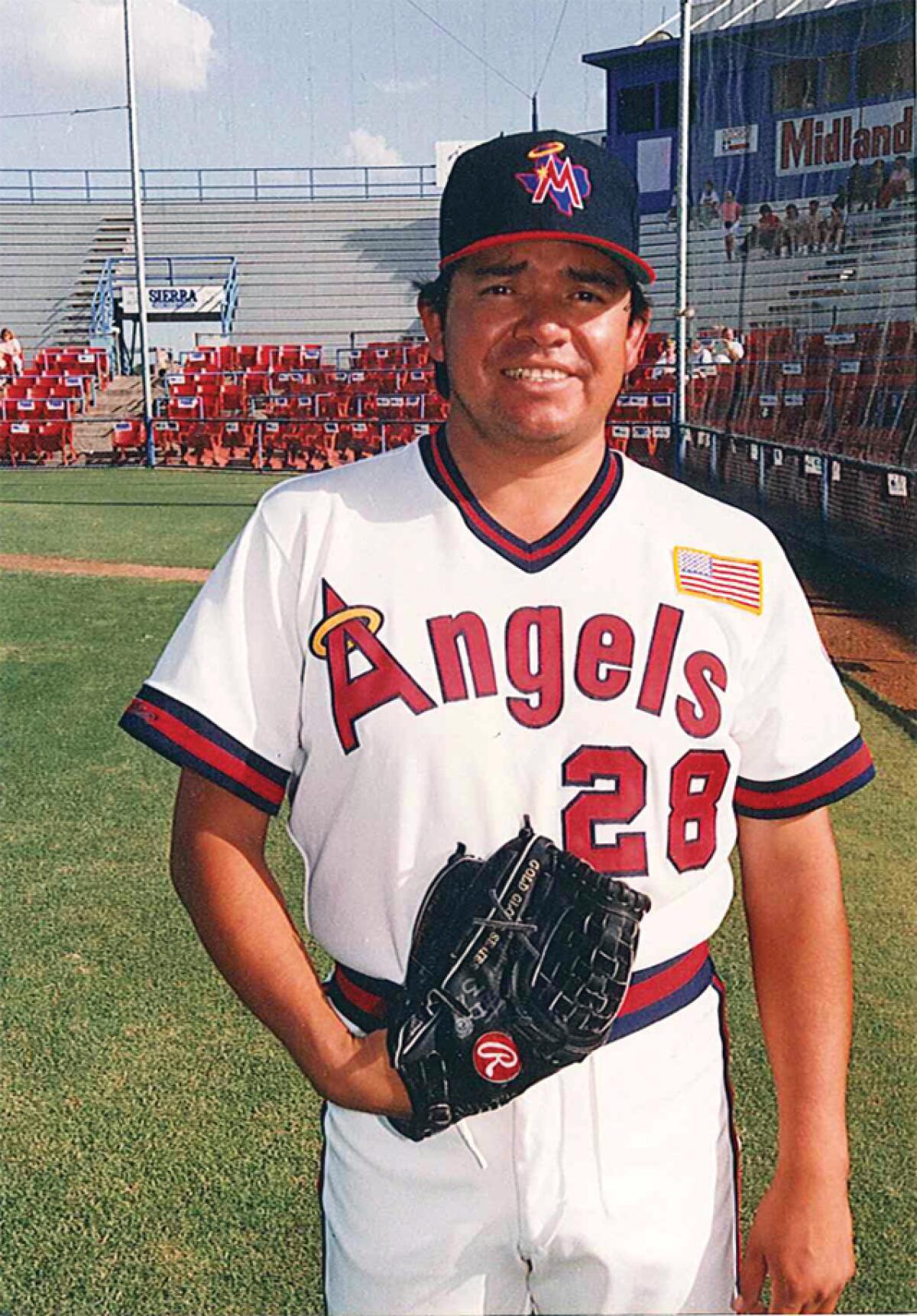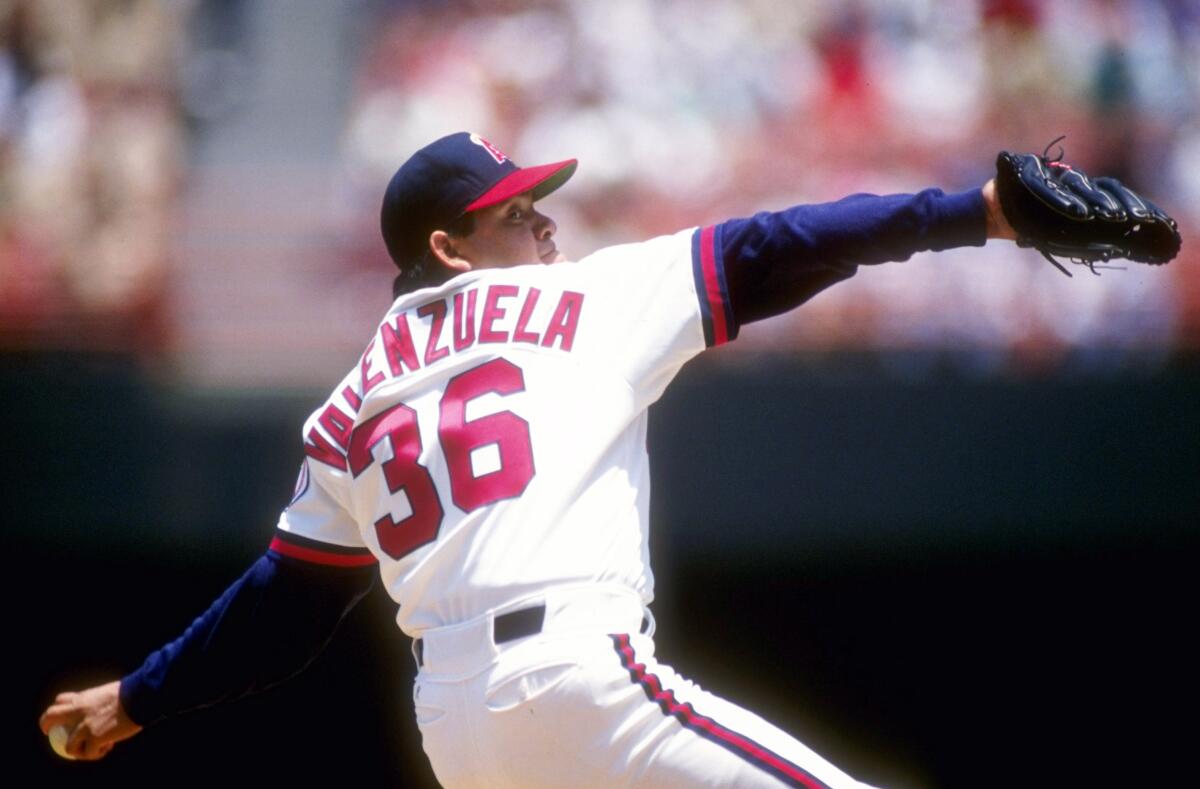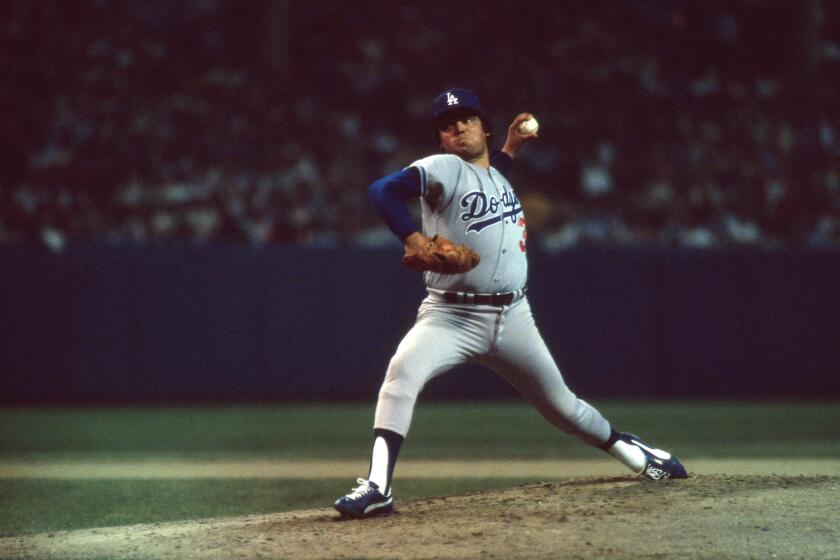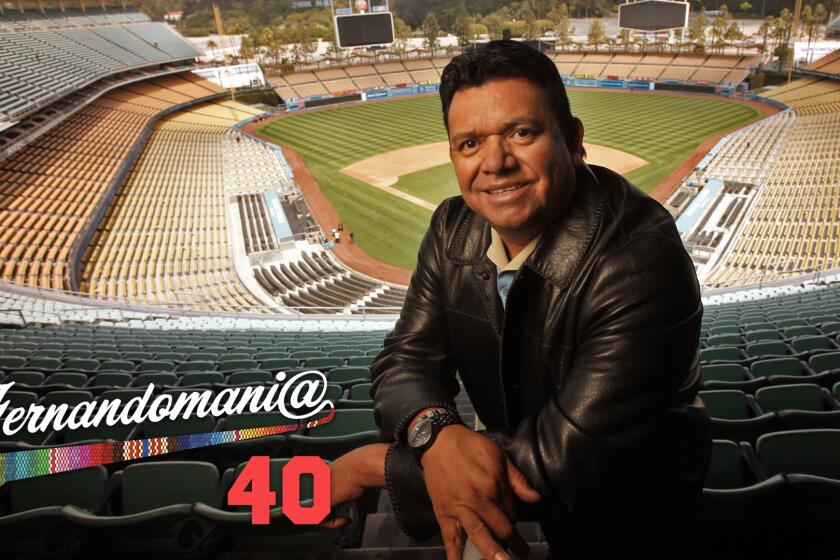The last wave of Fernandomania played out in Texas, where fans rushed to see a legend

- Share via
On March 28, 1991, the Dodgers released Fernando Valenzuela. It was a Thursday and about a decade since the Mexican caused a near hysteria when he pitched. In that decade that followed Valenzuela’s arrival, he’d helped the team win four National League West titles and two World Series. Valenzuela won the Cy Young award and voted Rookie of the Year in 1981, then became a six-time all-star.
In that time, away from the diamond, he’d cemented himself as a cult hero among Mexican and Mexican Americans who, in their inspiration, wrote songs in his honor and painted murals of Valenzuela. Whenever he made appearances around East Los Angeles— at parks and at schools, where he’d tell children to keep studying — people would rush to reach out their hands towards him. When he pitched, cars lined up hours before the game started, and even nuns would say an extra prayer for him.
Here’s why Los Angeles Dodgers pitcher Fernando Valenzuela’s magical 1981 season still inspires us today.
Then he was gone. And the shock and hurt made some fans think the organization used him. “He gave them everything he had,” one fan, Raul Montesinos, told The Times. “It’s like a worker when he’s all used up and the boss gets rid of him because he’s of no use anymore.” Valenzuela, even to the end, was entirely relatable.
Valenzuela, for his part, said despite getting released he still felt good. “I still feel I can pitch,” he said. “I hope I can get with a new team, start a new life.”
::
Midland, in West Texas, so isolated its existence and name come from it being the halfway point between Fort Worth and El Paso, sits atop one of the largest oil reserves in the world. It’s the type of place where people come to strike it rich, start a new life and sometimes both. And so, that Valenzuela ended up in Midland in 1991, after signing with the Angels and working his way up through double-A, felt oddly fitting.
“It’s different, especially if you spent a decade in the major leagues,” Alex Treviño said of playing in Midland. Treviño is a former catcher who played 13 years in the majors. He’s now a Spanish radio broadcaster for the Houston Astros. At three stops along their respective careers, Treviño and Valenzuela were teammates.
Early in their careers they played on the same team during the Caribbean Series. Then, in 1986, with the Dodgers, Treviño and Valenzuela became the first Mexican battery in the history of Major League Baseball. And finally, in 1991, they were part of the Midland Angels. Both were trying to play their way back to the majors from this place that, Treviño said, made you notice “you’re not the same player and maybe you should start thinking about doing something else.” But more than just playing baseball in Midland, it was playing baseball in the Texas League.
Fernando the pitcher might have faded into mediocrity, but Fernando the legend will live on forever.
“It’s the oldest double-A league,” Tom Kayser said of the Texas League. He served as the league’s president for 25 years, retiring before the start of the 2017 season. Kayser’s also the Texas League’s historian, writing two books on the subject. In between his job as president — which included ordering equipment, editing the media guide and taking the annual phone calls from unhappy general managers who hated their teams’ schedules — he’d sometimes spend the hours before games, at a library reading articles on microfilm.
Talk with Kayser about Texas League baseball and he’ll tell how the first game, between the Houston Babies and Galveston Giants, took place on April 1, 1888. How in 1902, in a game where Jay Clarke hit eight home runs, the Corsicana Oil City Oilers beat the Texarkana Casketmakers 51-3. He can tell you of the many teams that came and went with Texas oil’s boom and bust. About the type of things minor league teams must do to draw fans. Firework shows, a visit from the San Diego Chicken and free baseball cap night were the most conventional. But there were also other promotions that strayed into the realm of the bizarre. “You had Captain Dynamite who would blow himself up between games of a doubleheader, that’s probably the kookiest one,” Kayser said of the unconventional promotions.
And, of course, Kayser can tell you about the few nights Valenzuela pitched in the Texas Leagues. “It was just like L.A., when he was a rookie. It was wild,” Kayser said of the overflowing crowds — some drove hundreds of miles — who watched Valenzuela pitch.
In late May, on his first start for the Midland Angels, Valenzuela pitched six shutout innings in front of 6,252 fans — a club record — despite the stadium in Jackson, Miss. having just 5,200 seats. A few days later, in Little Rock, Ark., Valenzuela’s start added $10,000 worth of ticket sales plus a presumed increase from concessions, money that was oxygen for Texas League teams sometimes choked by economic constraints. The same thing happened in Midland, where Valenzuela pitched in mid-July on a separate trip through the Texas League.

“We roped off the berm and we had fans on the warning track and down the sides,” Monty Hoppel, general manager of the Midland Angels — now the Midland Rockhounds — said of when Valenzuela pitched in West Texas. “You can’t do that these days, obviously, but we just packed it in, in a little stadium.” The demand for tickets was so high that a few nights before Valenzuela’s scheduled start, when Hoppel discovered fans trying to enter the stadium with counterfeit tickets, he figured it was a trial run for when the Dodger legend pitched.
This was Valenzuela, not the pitcher who was struggling to save his career, going back-and-forth between the major leagues and minor league assignments. This was Valenzuela, the folk hero who still drew record crowds, many of them Mexican and Mexican Americans from Midland and the surrounding areas. The Valenzuela, who, almost as soon as he arrived in West Texas, Elvia Hernandez, president of the Midland Hispanic Chamber of Commerce, invited him to the city’s annual menudo cookoff. “Menudo is the breakfast of champions,” Hernandez said, “[and] Fernando is a champion.”
On a hot West Texas summer night, the 30-year-old Valenzuela, trying to start a new life while trying to keep his career alive, pitched five innings. He allowed three hits and one run. The Midland Angels won, and fans cheered for him like they had done across the major leagues a decade before. Valenzuela made four starts for Midland, finishing with a 3-1 record with a 1.96 ERA.
“In Midland, Texas, on a Friday night he was the King,” the local newspaper wrote of Valenzuela.
::
In his last years as a professional, after the Angels released Valenzuela some 3-1/2 months after they signed him, he pitched seemingly any place that would have him.
He returned to Mexico, playing for the Jalisco Charros, where thousands of fans — ten times more than usual games attracted — would come to watch Valenzuela wind up, look towards the heavens as he kicked his leg high, and throw the ball. “Toro! Toro! Toro!” the fans chanted, even if the baseballs he threw didn’t travel as fast or as well as they had before.
“Now it’s our time to see him in person,” one fan, Nicomedes Leon, said. Until then, most of Mexico had only seen Valenzuela — the mania, the World Series, the awards, the no-hitter, the poor boy who became a folk hero — on television. “Fernando’s arm now belongs to the pueblo of Mexico,” Leon continued. He’d brought his nine-year-old son to watch Valenzuela pitch. “We see him as a star … whether he’s a good pitcher or not.”
‘Fernandomania @ 40’ is a multi-episode documentary series that examines star pitcher Fernando Valenzuela’s impact on the Dodgers, Major League Baseball and the Latino community in Los Angeles 40 years ago.
After Jalisco, Valenzuela returned to the majors in 1993. He played in Baltimore, Philadelphia, San Diego, St. Louis and then again in the Mexican Leagues. At each of his stops, Mexican and Mexican American fans came to see what remained of Fernandomania. It was never the same as it was when Valenzuela was at his athletic peak. But it still meant something. Because Valenzuela, more than just a baseball player, was a prism into the Mexican and Mexican American experience across the Southwest.
He was the reason they watched. The reason they became Dodgers fans without once stepping foot in Los Angeles.
Forty years later, even people who weren’t alive when he pitched, still talk about him decades after the mania.
Roberto José Andrade Franco is an author, freelance journalist and writer-at-large for Texas Highways.
More to Read
Are you a true-blue fan?
Get our Dodgers Dugout newsletter for insights, news and much more.
You may occasionally receive promotional content from the Los Angeles Times.












